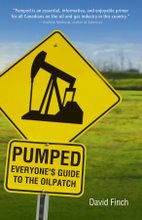Words can be frightening. There is a shudder going through many people in Alberta this fall. Is Alberta about to announce its own NEP?
This week's report by the panel appointed by the Alberta government to investigate the provincial oil, gas and bitumen royalty is being greeted by some as an intrusion into the free enterprise system.
Can you imagine the reaction to this panel's report if its members had been appointed by politicians in Ottawa instead of Edmonton?
A careful readying of the report reveals the shocking assumption that the people own the resource. That they have not been getting a fair share of the profits - for many years. It suggests a modest increase in royalty "take" of about 20% more, if the price of petroleum stays stable.
It calls for government to pay closer attention to the numerous complicated forces that affect the petroleum industry. And for a new government agency to report more frequently and in a clearer manner to the public. For new levels of taxation to make sure the owners of the resource do not lose billions of dollars that is their due.
The panel's report even calls for a Crown Land Conservation Tax on all petroleum, forestry, mining and agricultural activities on government land. The $750 million raised each year would fund research and innovation programs to assure that resource extraction in the future is done with careful consideration for the environment.
And it calls for cumulative effects monitoring. Tens of thousands of oilwells do make a difference.
Had these recommendations been forced on Alberta by Ottawa - like climate change - we could blame it on the Liberals, the NDP or the Green Party. But these suggestions, and many more, came from a business savvy panel of Alberta residents.
Alberta's new premier will respond to this report in a few weeks. Perhaps October 2007 will be remembered as the month when the people of Alberta finally stopped blaming others for their problems - Ottawa, interest rates, the strong dollar, the American economy.
If the people of Alberta are brave enough to create their own Natural Energy Plan that takes charge of the development of their resources, they could provide leadership to the whole country.
Alberta's NEP of 2007 could accomplish what the NEP of 1980 failed to provide - a comprehensive, flexible and responsible reaction to high world oil prices.
For more details on seven previous national energy programs, dating back to Sir John A. Macdonald, and on the forces that create the booms and busts, see the chapters on these topics in PUMPED: Everyone's Guide to the Oil Patch.
 At last night's illustrious Energy TV Awards ceremony at the Hyatt Regency in Calgary, David Finch was named "most influential author in the oilpatch" for Pumped: Everyone's Guide to the Oilpatch. Fifth House Publisher, Charlene Dobmeier, accepted the award on Finch's behalf as he was unavailable.The Energy TV Awards is a bit of a send-up of the Academy Awards. Those of us who attended donned gowns and tuxes. A be-glittered male character escorted female guests down the patch of red carpet. Dinner was an elegant affair where the wine flowed on and jokes from the podium punctuated conversation at the tables. There was even an after-party at a nearby nightclub.
At last night's illustrious Energy TV Awards ceremony at the Hyatt Regency in Calgary, David Finch was named "most influential author in the oilpatch" for Pumped: Everyone's Guide to the Oilpatch. Fifth House Publisher, Charlene Dobmeier, accepted the award on Finch's behalf as he was unavailable.The Energy TV Awards is a bit of a send-up of the Academy Awards. Those of us who attended donned gowns and tuxes. A be-glittered male character escorted female guests down the patch of red carpet. Dinner was an elegant affair where the wine flowed on and jokes from the podium punctuated conversation at the tables. There was even an after-party at a nearby nightclub.
